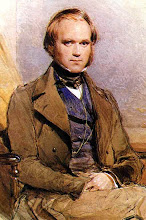One morning the view was singularly clear; the distant mountains being projected with the sharpest outline, on a heavy bank of dark blue clouds. Judging from the appearance, and from similar cases in England, I supposed that the air was saturated with moisture. The fact, however, turned out quite the contrary. The hygrometer gave a difference of 29.6 degrees, between the temperature of the air, and the point at which dew was precipitated. This difference was nearly double that which I had observed on the previous mornings. This unusual degree of atmospheric dryness was accompanied by continual flashes of lightning. Is it not an uncommon case, thus to find a remarkable degree of aerial transparency with such a state of weather?
Generally the atmosphere is hazy; and this is caused by the falling of impalpably fine dust, which was found to have slightly injured the astronomical instruments. The morning before we anchored at Porto Praya, I collected a little packet of this brown-coloured fine dust, which appeared to have been filtered from the wind by the gauze of the vane at the masthead. Mr. Lyell has also given me four packets of dust which fell on a vessel a few hundred miles northward of these islands. Professor Ehrenberg finds that this dust consists in great part of infusoria with siliceous shields, and of the siliceous tissue of plants. In five little packets which I sent him, he has ascertained no less than sixty-seven different organic forms! The infusoria, with the exception of two marine species, are all inhabitants of fresh-water. I have found no less than fifteen different accounts of dust having fallen on vessels when far out in the Atlantic. From the direction of the wind whenever it has fallen, and from its having always fallen during those months when the harmattan is known to raise clouds of dust high into the atmosphere, we may feel sure that it all comes from Africa. It is, however, a very singular fact, that, although Professor Ehrenberg knows many species of infusoria peculiar to Africa, he finds none of these in the dust which I sent him. On the other hand, he finds in it two species which hitherto he knows as living only in South America. The dust falls in such quantities as to dirty everything on board, and to hurt people's eyes; vessels even have run on shore owing to the obscurity of the atmosphere. It has often fallen on ships when several hundred, and even more than athousand miles from the coast of Africa, and at points sixteen hundred miles distant in a north and south direction. In some dust which was collected on a vessel three hundred miles from the land, I was much surprised to find particles of stone above the thousandth of an inch square, mixed with finer matter. After this fact one need not be surprised at the diffusion of the far lighter and smaller sporules of cryptogamic plants.
Subscribe to:
Post Comments (Atom)





No comments:
Post a Comment